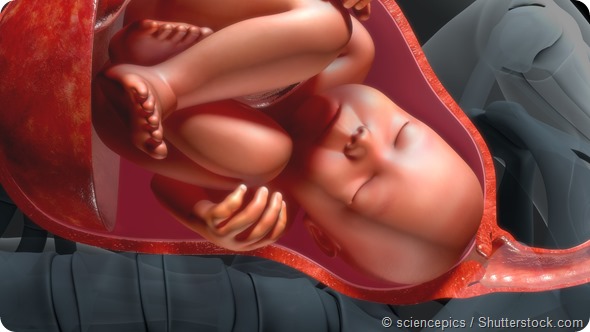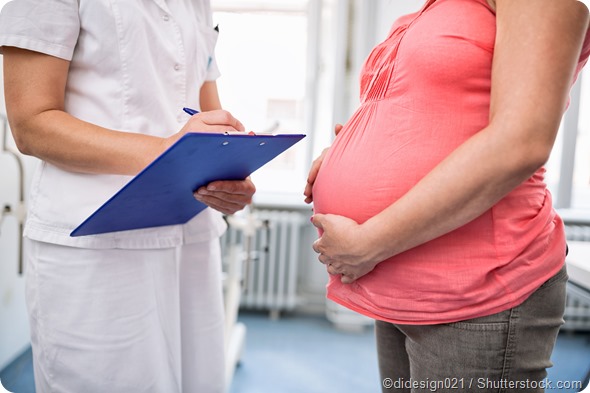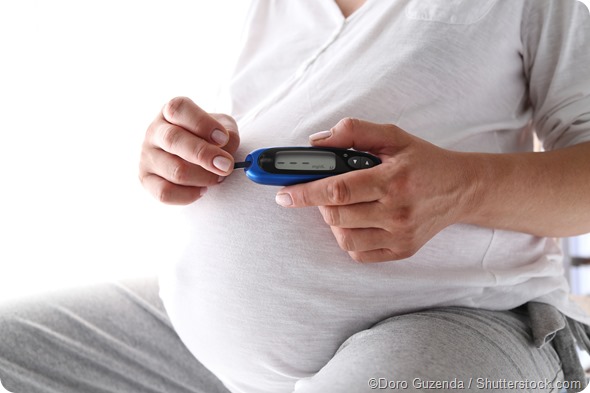There is incontrovertible evidence that some harmful drugs and toxins can affect lifelong health. For example, if women take certain drugs in pregnancy, such as thalidomide, there are well documented effects on lifelong health. These have obvious and dramatic effects on the child.
Environmental pollutants can also interfere with fetal growth and influence later health; we know that maternal exposure, especially to traffic pollutants such as nitrogen dioxide, can lead to babies being born with a low birthweight, which may predispose the child to infant and adulthood ill health.

However, there are more insidious effects which aren't immediately obvious. There is increasing evidence that the mother's diet, weight and weight gain in pregnancy, and complications of pregnancy such as gestational diabetes and preeclampsia can all affect the health of the child.
This occurs in the longer term and it's not so immediately obvious as something like a drug, but it's nonetheless now suggested to be a very important determinant of the risk of common diseases like obesity and diabetes in later life.
Some of the first evidence that maternal nutrition could have insidious and long term effects on the health of the child was derived from studies of children whose mothers experienced famine in the last few months of the second World War, the ‘Dutch Hunger Winter’.
Essentially, the occupying Nazis restricted food supplies to some cities eg, Amsterdam, and the mothers were severely restricted in their diet and the dietary intake in pregnancy. Despite this, very detailed clinical records continued to be recorded including the gestation at which the mother was exposed to famine, and the birthweight and placenta weight were noted.
In the last 20 or 30 years, researchers have followed up the children born to those mothers and found that the experience of famine in utero was associated with quite significant defects on the health of the child such as increased obesity, increased risk of cardiovascular disease and abnormal blood lipids. This was an unfortunate natural ‘experiment’ which showed that nutrition in utero is very important in terms of lifelong health for the child.
The emphasis has now changed in developed countries and more recently to developing countries too, to the effects of maternal obesity, which is remarkably prevalent in our population. The United Kingdom has the highest level of maternal obesity in Europe.
Any high income country now has a big problem with obesity. Those geographical reasons which are now showing the greatest rise obesity are those which historically have been undernourished. Countries like South Africa, for example, now have a new problem with maternal obesity, as the region transitions from dietary deprivation to dietary plenty.
Researchers, including ourselves, have therefore been looking at the relationship between maternal obesity, the weight the mother puts on in pregnancy, and the risks to the child. The first thing to note is that there is an immediate and very obvious risk to the obese mother in relation to a heightened chance of developing diabetes in pregnancy. In turn this can lead to the child being born too large.
Large for gestational age infants, as these babies are known, can have problems at delivery in that there a higher risk of the mother not being able to deliver vaginally with a greater chance of the need to deliver for caesarean section, and a higher risk of damage during delivery and of stillbirth, amongst other problems.
Babies that are born too large tend to become overweight adults. There is an association between adiposity at birth, that's the amount of fat, and adiposity in later childhood.
Children who are overweight at nursery school age tend to become obese adolescents, and obese adolescents have a higher risk of obesity in adulthood. Increasing evidence therefore suggests that being developed in the womb in the face of maternal obesity and maternal diabetes has a persistent effect on the obesity and diabetes in the child.
You might say, "Well, the mother is feeding the child the same diet as she might feed herself, so of course that's going to be the case," but the statisticians have adjusted for many of those socioeconomic and family environment factors, and still find that there is a relationship between development in utero in relation to obesity and excessive maternal gestational weight gain and gestational diabetes, and the risk of obesity and diabetes in the offspring.
Whilst those studies certainly infer causality, that means the utero environment can definitely lead to obesity in the child, observational, longitudinal studies like these can never really conclusively suggest causality.

Can you please outline your research?
We undertook a randomized control trial of one and a half thousand obese pregnant women, which we published last year. We found that we were able to help the mothers improve their diet and reduce their weight gain in pregnancy, as well as their fat mass.
However, these positive changes were not adequately large to effect a reduction in diabetes in the mothers, which was the primary intention of the study
More recently, we've been studying the children as they're growing up. We found that at the age of six months, those children who were born to mothers in the intervention arm who lost the weight or didn't put on so much weight as the others, were a bit thinner than the children born to mothers who were in the control group ie those who just had normal pregnancy care.
Randomized control trials provide proof because by randomly allocating women into two groups- those who receive the intervention and those in the standard care arm, any problems about there being other interfering factors like environment, maternal diet and so on affecting the family diet are removed because they're the same in both groups. For this reason, randomised control trials are the statistical gold standard for assessing causality.
We've shown for the first time that these children are a bit thinner, although not by a huge amount. Then we did further statistics where we looked to see whether this was due to any changes in breastfeeding or in changes in the maternal diet, because we had found that the mother still had a better diet six months postpartum.
It turned out that mothers’ persistently changed diet was unlikely to be the reason, our data suggested that the reason was the exposure in utero to a slightly improved metabolic environment in relation to the intervention, the reduction in weight gain, and improvement in the mother's diet.
We're following the children up now at three to four years of age. We're going to finish that next year, and we'll be able to see whether they remain thinner. The inference may be that rather than starting to prevent childhood obesity when a child is a toddler or indeed when a child is at school, which is what the new UK government childhood obesity plan is suggesting, we should think about starting much earlier.
We should perhaps start in pregnancy, so we improve the diet of the mother and stop her putting on too much weight but this alone will not solve the problem. Better still, we should focus on preventing mothers becoming obese in the first place.
That is where the focus must now be. We need to improve the educational awareness of women about the problems of obesity in pregnancy. Most people, including some health professionals, have no idea of the serious problems that can arise in pregnancy, nor of the potential risks for the lifelong health of the child
It is very important that women should be made aware that to become pregnant when obese can lead to complications, and also may increase the risk of obesity in the child.
Were you surprised by your findings so far?
No, because we were addressing a hypothesis that had arisen because of the association with maternal obesity and childhood obesity from the longitudinal studies, the birth cohort studies, as we call them. They were suggesting these associations, but we wanted to try and prove it.

How common is gestational diabetes? Is it on the rise?
It's very common. In fact, there's a global epidemic, because obesity has gone up dramatically across the world. If the most rigorous diagnostic test for gestational diabetes is used, one in four women with a BMI of over 30kg/m2 will develop gestational diabetes.
It's very underdiagnosed partly because diagnostic tests and pregnancy diabetes care costs money and we have so many obese and overweight women now that not everybody gets the test; it’s becoming too expensive to look after them all.
What are the causes and risk factors for gestational diabetes and can it be prevented?
The biggest cause is obesity. However, there are other causes that we don't know about, as thinner women can also get gestational diabetes. Also women have pre-existing type 2 diabetes, even if well controlled, are more likely to develop gestational diabetes. It's a real problem controlling glucose in people who've already got type 2 diabetes.
Many obese women, unbeknownst to them, will already have type 2 diabetes before they become pregnant. One recommendation is that obese women should ask for their blood sugar to tested if contemplating pregnancy. If they are found to have type 2 diabetes before they're pregnant, they should be treated beforehand; this will help their pregnancy and prevent complications.
Otherwise, there is a predisposition to gestational diabetes in Asian women, many of whom will be not be obese. It may just be that they have a different distribution of body fat, with more central body fat, which could contribute to development of diabetes.
Diet is very important. If you consume a lot of sugary food and drink and eat fatty foods, you're more likely to get gestational diabetes because this sort of diet is not good for maintaining normal concentrations of glucose in the blood. If you develop gestational diabetes, the first line of treatment is to improve the diet.
A low glycemic index diet (low in sugary foods, and rapid sugar-releasing carbohydrates), a low fat and a high fiber diet is the diet recommended for women with diabetes. It is possible to substantially improve your blood glucose with diet.
Is there anything a woman can do in pregnancy to minimise the risk of her child becoming overweight or obese in childhood or later life?
There are a number of precautions. One of the most important is, if the pregnant woman has obesity or if she's put on a lot of weight, to make sure she has the test for diabetes between 26 to 28 weeks of gestation. If she has developed diabetes, she will be treated for it and that will stop the baby getting too big. If a mother is obese in antenatal care and she hasn't been offered the diabetes test, she should ask for it.
The second precaution in terms of diet, is to not to eat for two. Many pregnant women think they need to eat for their baby as well but they don’t - you really only need to have an average of about 200 extra calories a day if you're pregnant.
When women are pregnant they tend to be thirsty and drink a lot of fluids. If they're consuming sugar sweetened drinks, they're full of calories. It is also advisable to restrict intake of fruit juices which are also very calory-rich. Water is best.
Another recommendation is to eat more complex carbohydrates, that's carbohydrates which are complex sugars rather than free sugars. We're talking about things like brown bread versus white bread, whole potatoes versus mashed potatoes.These are the low glycemic index diet foods will help in terms of glucose control.
It's glucose which makes babies fat, so don’t eat too much sugar, but saturated fat can create glucose problems too. Just generally eat well and sensibly, plenty of fresh fruit and vegetables and oily fish which contains fatty acids good for the baby’s developing brain.
The other thing is to exercise. Exercise in pregnancy is good for you, as long as it's not too vigorous, and take it gently if you don’t normally do much exercise. People used to exercise should carry on exercising about three times a week, and others build up to this gradually. Brisk walking is recommended to be appropriate for all women, but other sports are OK except contact sports; all generally improve health.
How about before pregnancy?
The obvious thing before pregnancy, would be for people who are overweight to lose weight. However, its more sensible to lose weight first before trying to get pregnant
The other most important recommendation is to take folic acid, which helps in terms of the prevention of spina bifida and to improve their dietary health generally. Most people know how to improve their health, but if they're thinking about becoming pregnant, before they become pregnant they should make a concerted attempt to improve their health in all directions.
The problem needs help from government too; I see it as being like smoking cessation, which in the UK only was really only effective when government stepped in. If we really want to prevent this dramatic problem amongst our population, when are we likely to start seeing obese and diabetic children dying before their parents, we need approaches not only at the personal level but through fiscal and governmental measures.
What do you think are going to be the main hurdles to overcoming childhood obesity moving forward?
My opinion is that the only way we're going to be able to adequately reduce childhood obesity, and thereby adult obesity is through government measures. We had great hopes for the Childhood Obesity Plan which has gone as far as increasing a sugar tax, but that's not enough.
I don't think that recommending things to women is the most effective approach - overweight people know that they should lose weight, but it’s not easy to action. It has to be done as a more governmental level.
I think there should be compulsory physical activity in schools, which there isn't at the moment. There should be total removal of sweets and crisps from around counters in supermarkets. All foods should have a label of sugar on it and have a traffic light warning system. All of that has to come from government.
How much further research is needed to understand childhood obesity and the impact of the environment before birth?
We need more big studies like the one that we've done. We need to understand the mechanism better, so we are measuring everything we can think of in the mother's blood. We're measuring things when the baby's born, in the cord blood. We're seeing what particularly it is that causes the babies to be too big.
The obvious candidates are glucose and insulin in the mothers. The glucose gets across the placenta then the glucose stimulates the fetus to produce insulin which causes the overgrowth. We know about that, but there seems to other factors and lipids and fats which cross the placenta and cause the babies to get fatter.
We're thinking about interventions which specifically focus on glucose and lipids. Are we actually recommending absolutely the best diet? We don't know that, so we hope by understanding the mechanisms we can modify diet and also treatment with drugs.
We need to look all the time for better pathways, better, new drugs. There are some new drugs coming on the market which haven't been used in pregnancy.
Where can readers find more information?
For healthcare professionals, the WHO have done a report on childhood obesity which was published in January called Childhood Obesity WHO.
There is also the UK government's childhood obesity plan.
Also the Chief Medical Officer's report on women, which was called Women 51% of the Population, was nearly all about obesity and pregnancy and the effect on the children.
We've written a series of reviews for the Lancet Diabetes & Endocrinology, which we published last month. I've done a big review on maternal obesity at population level, and the two other reviews are addressing ways of preventing, including fiscal government policy and interventions. A third one is about the effect on the child. Those three reviews in Lancet Diabetes & Endocrinology are very good sources of information at quite a detailed level.
For pregnant women, I think one of the best websites I know is Tommy's charity, who've got extremely good advice for overweight women, which we've helped write. It's all evidence-based. They also have a help line with midwives who can help talk to women about their concerns.
About Lucilla Poston

Tommys Campaign Professor of Maternal & Fetal Health. King’s College London. Department: Women’s Health. Clinical Academic Group: Women’s Health Clinical Academic Group.
Research interests
Developmental Origins of Health and Disease
The nutritional ‘environment’ in utero is now recognised to influence the risk of cardiovascular and metabolic disease in the offspring. Lucilla Poston's focus of this area of research is the consequences of maternal obesity and calorie-rich diets on the developing fetus.
Her laboratory was amongst the first to develop animal models which have shown that the offspring of obese rodents develop a predisposition to obesity, hypertension and insulin resistance at a young age.
Recent work has suggested that endocrine influences on the developing hypothalamus may permanently affect hypothalamic function, including pathwyas affecting satiety and blood pressure control.
In the clinic, Lucilla Poston's team have developed a complex intervention with the aim of improving pregnancy outcome and, potentially, reducing the risk of obesity in the child (the UPBEAT trial). This research is funded by the NIHR, the British Heart Foundation, the MRC, the BBSRC, Tommy’s Charity, the Earnest Programme (EU Framework 7) and commercial partners.
Pre-eclampsia
The Division of Women's Health at King's College London has a long standing interest in pre-eclampsia research. Pre-eclampsia remains a common disorder in pregnancy, affecting 3-5% of all pregnancies and threatening the health and indeed the lives of the mother and her baby. Characterised by hypertension and proteinuria, pre-eclampsia is a syndrome which can affect many organs including the brain, liver, lung and kidney.
Lucilla Poston's early research in this field contributed to the knowledge that endothelial dysfunction in maternal blood vessels plays a focal role in the disease, and that oxidative stress is likely to have a mechanistic function.
Her team showed that prophylaxis with antioxidants was not effective in preventionof pre-eclampsia. Much of her present research effort is directed towards early biomarker discovery which not only has benefit in terms of prediction of the disorder but also in identification of contributory causes.
This is undertaken as part of the SCOPE international collaboration, PI Professor Robyn North, a part time Professor in the Division. Funding for this research is provided by Guy’s and St Thomas’ Charity, Tommy’s Charity and commercial partners.